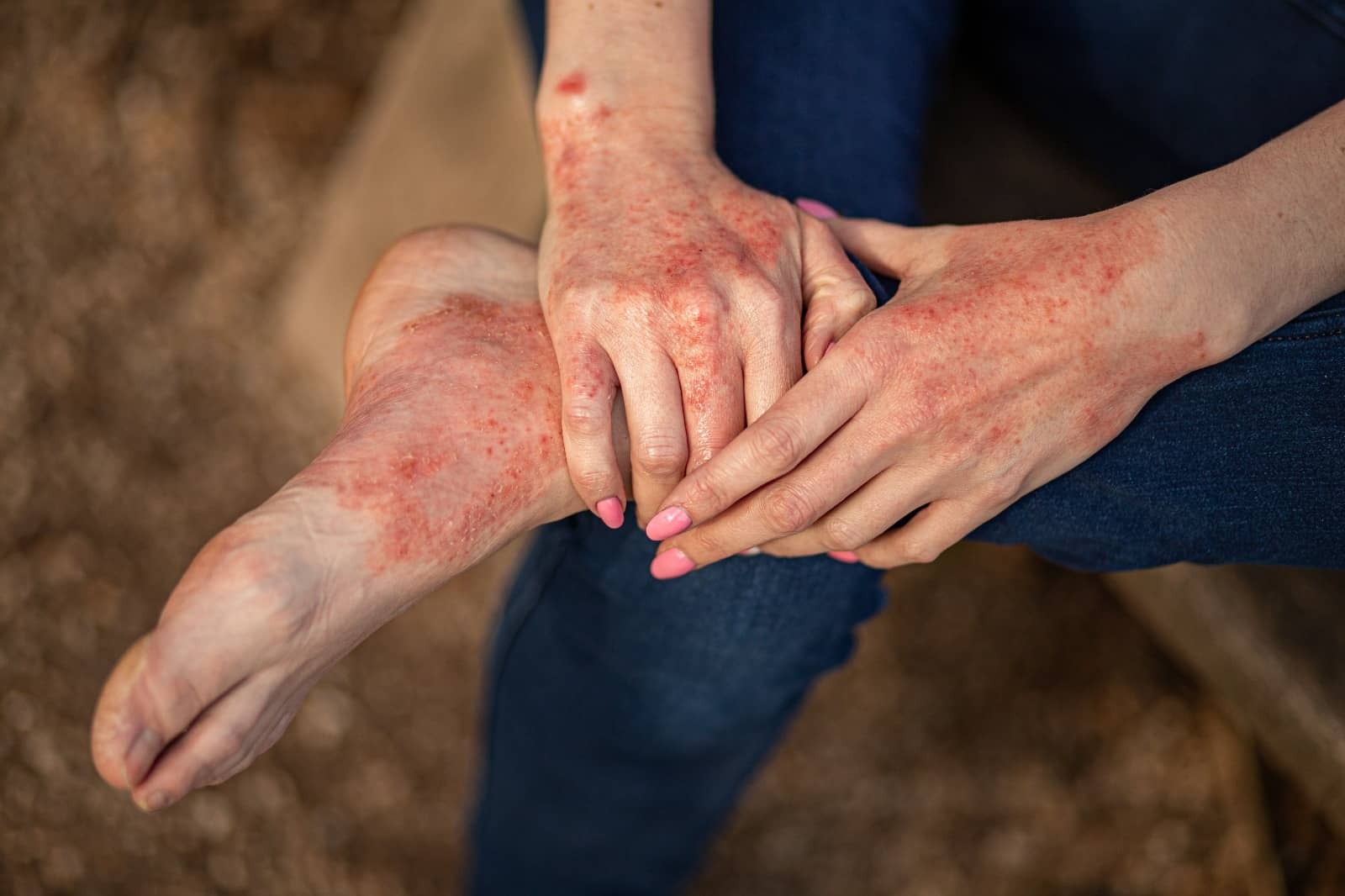How Your Diet Can Impact Psoriasis: Foods to Eat and Avoid

Psoriasis is a chronic autoimmune condition that affects the skin, causing patches of redness and scaling. While there’s no permanent cure for psoriasis, certain lifestyle changes, including diet, can help manage symptoms effectively. Many people with psoriasis have found that modifying their diet can reduce flare-ups and improve overall skin health. This blog will explore the relationship between diet and psoriasis, identifying trigger foods to avoid and foods that may support healing.
Relationship Between Diet and Psoriasis
So, how does diet affect psoriasis? Research suggests that inflammation plays a key role in psoriasis, and some foods can either help reduce or exacerbate inflammation. A diet rich in anti-inflammatory foods may complement traditional treatment, while avoiding certain triggers can minimise flare-ups. Additionally, psoriasis has been linked to gut health, meaning what you eat can influence your immune system and skin condition.
Food Triggers for Psoriasis: What to Avoid

Some foods are known to trigger inflammation, potentially worsening psoriasis symptoms. By identifying and reducing these dietary culprits, you may experience fewer flare-ups and improved skin health.
1. Dairy
Dairy products, such as milk, cheese, and butter, can provoke an inflammatory response in some individuals due to their high levels of saturated fat and proteins like casein, which some people find hard to digest. Additionally, dairy contains arachidonic acid, a compound that has been linked to the triggering or worsening of inflammatory skin conditions like psoriasis. For some, cutting back on or eliminating dairy may help reduce flare-ups and improve overall skin health.
2. Gluten
For those with gluten sensitivity or celiac disease, avoiding foods containing wheat, barley, and rye can lead to significant improvements in both digestive health and psoriasis symptoms. Gluten is known to cause inflammation in individuals who are intolerant to it, and even people without a formal diagnosis have reported relief from psoriasis symptoms after removing gluten from their diets. If you're considering eliminating gluten, it may be helpful to consult with a healthcare provider or try a gluten-free diet to see if it makes a difference.
3. Red Meat
Red meat, especially processed varieties like bacon, sausage, and hot dogs, contains high levels of saturated fat, cholesterol, and compounds such as advanced glycation end products (AGEs). These can trigger inflammation in the body and potentially worsen psoriasis symptoms. Processed meats also often contain added preservatives and salts, which contribute to poor health outcomes. Instead, opting for lean protein sources like fish, chicken, or plant-based proteins can provide the nutrients you need without the added inflammation.
4. Alcohol
Alcohol is a common trigger for many people with psoriasis and can impact the immune system, making it harder for the body to manage inflammation. Regular alcohol consumption has been shown to increase the risk of flare-ups, as it can dilate blood vessels and allow inflammatory cells to reach the skin more easily. Additionally, alcohol can interfere with some psoriasis medications, reducing their effectiveness. Limiting or avoiding alcohol can help control symptoms and support overall health.
5. Sugar
High-sugar diets can lead to spikes in blood sugar levels, promoting chronic inflammation and contributing to weight gain—both of which can exacerbate psoriasis symptoms. Consuming large amounts of sugary snacks, desserts, and processed foods can also lead to insulin resistance, which is linked to increased inflammation throughout the body. Reducing your intake of sugary foods and drinks can help manage psoriasis more effectively while also improving your overall well-being. Replacing sugary snacks with whole foods, such as fruits and nuts, is a healthier alternative.
Food Recommendations for Psoriasis

Incorporating anti-inflammatory foods into your diet can improve overall health and help manage psoriasis symptoms. Here are some foods to prioritise:
1. Fruits and Vegetables
Fruits and vegetables are bursting with antioxidants, vitamins, and essential nutrients that help combat inflammation and promote overall health. Leafy greens like spinach and kale are rich in vitamin K, which has anti-inflammatory properties, while berries, such as blueberries and strawberries, are loaded with antioxidants that fight free radicals. Carrots and other orange vegetables contain beta-carotene, known to support skin health and reduce inflammation.
2. Nuts and Whole Grains
Nuts like almonds and walnuts are packed with healthy fats, including omega-3 fatty acids, which are known to lower inflammation in the body. They also provide a good source of protein and other essential nutrients. Whole grains, such as quinoa and brown rice, are high in fiber, which supports gut health by feeding good bacteria in your digestive system. A healthy gut has been linked to lower levels of inflammation throughout the body.
3. Heart-Healthy Oils
Heart-healthy oils like olive oil and avocado oil are excellent sources of omega-3 fatty acids and monounsaturated fats, which have been shown to reduce inflammation and support heart and skin health. These oils are a perfect substitute for saturated fats like butter, which may worsen inflammation. Use them in your cooking or as a dressing for salads to incorporate anti-inflammatory benefits into your diet.
4. Supplements and Vitamins
For people with psoriasis, certain supplements and vitamins can offer targeted support for managing symptoms and reducing inflammation:
Fish Oil
Fish oil is an excellent source of omega-3 fatty acids, which have strong anti-inflammatory effects. Studies suggest that regular fish oil supplementation may help reduce the severity and frequency of psoriasis flare-ups.
Vitamin B12
Vitamin B12 plays an essential role in maintaining healthy skin, and deficiencies in this nutrient have been linked to worsening psoriasis symptoms. Adding a B12 supplement or consuming B12-rich foods can help improve skin health.
Vitamin D
Vitamin D, often called the "sunshine vitamin," supports the immune system and helps regulate inflammation. It may be particularly useful for managing psoriasis symptoms during flare-ups or in the colder months when natural sunlight exposure is limited.
Legumes
Legumes, including lentils, chickpeas, and black beans, are packed with fiber, plant-based protein, and essential nutrients like iron and potassium. They promote a healthy gut microbiome, which plays a key role in reducing systemic inflammation and supporting overall wellness.
Related: Anti-Acne Diet 101: The Relationship Between Food and Acne
When to Seek Professional Help for Psoriasis Management
While diet can be a powerful tool for managing psoriasis, it’s not a substitute for professional care. If symptoms persist or worsen despite dietary changes, consult with a dermatologist or healthcare provider. They can help identify potential triggers, recommend treatments, and tailor a care plan towards addressing your psoriasis.
Get Personalised Psoriasis Care
Managing psoriasis is a journey, and your diet is just one piece of the puzzle. By identifying food triggers and embracing anti-inflammatory options, you can take steps toward healthier skin and fewer flare-ups. For tailored advice, consider working with a healthcare professional or nutritionist who specialises in psoriasis care. A personalised approach can make all the difference in achieving long-term relief.
Here at Skin to Heart, our team of experts offers personalised psoriasis care, taking a holistic approach to managing symptoms. Contact us today to learn more about our treatments and how we can support you on your journey to healthier skin. Let’s work together towards a happier, healthier you.
- Tags: psoriasis
0 comments

